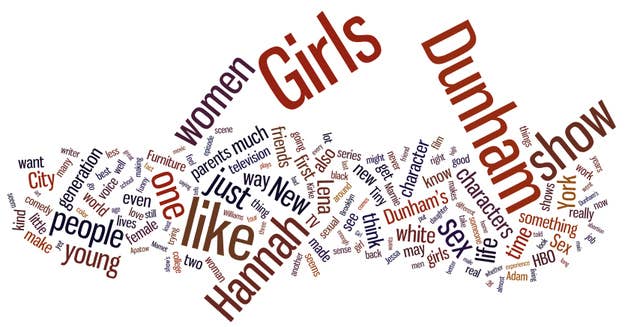
About 810,000 people watched the premiere of Girls. In the last two weeks, a minimum of 60193 words have been written and published about the show by paid writers. That works out to about one word for every 14 people that watched the show, and about one published character for every 2.3 viewers.
The text file I pasted all these articles (41 of them!) into is longer than Fahrenheit 451, the same length as The Scarlet Letter and a little less than half as long as A Tale of Two Cities. (I'm sure it would feel longer than all of them combined.) This is the TV equivalent to one of those HuffPo stories with 150 words and 3,050 comments. It doesn't really... make sense?
Last year I spoke with the research heads at both NBC and CBS for a story about Nielsen, and both hinted that they keep track of engagement — that is, they track what people are saying about their shows. Both hinted that this info, which you could loosely refer to as a show's engagement "score" has some value when it comes to determining whether or not to cancel a show.
It's obvious that this research could matter to advertisers — super-intense viewers pay more attention to both the show and its ads — but Girls doesn't have advertisers. And everyone, including Nielsen, is still struggling to turn this kind of nebulous information into actionable data. For now, engagement is effectively worth very little to the people who make TV.
Girls doesn't have "engagement" in the same way that a beloved-but-underwatched show like Community does. But it does have something. It seems like we ought to be able to come up with some way to quantify this absurd outpouring, something between a Nielsen rating, a RottenTomatoes meter and a Klout score; a word-to-viewer ratio mixed with a textual analysis mixed with, oh, I don't know, polls or something? Ratings and straightforward reviews don't tell enough of the story; the rest of the internet tells too much of it.
Oh, but one thing: The score has to be able to go negative. Reflexive mass chatter has ruined shows before. It will ruin again.
